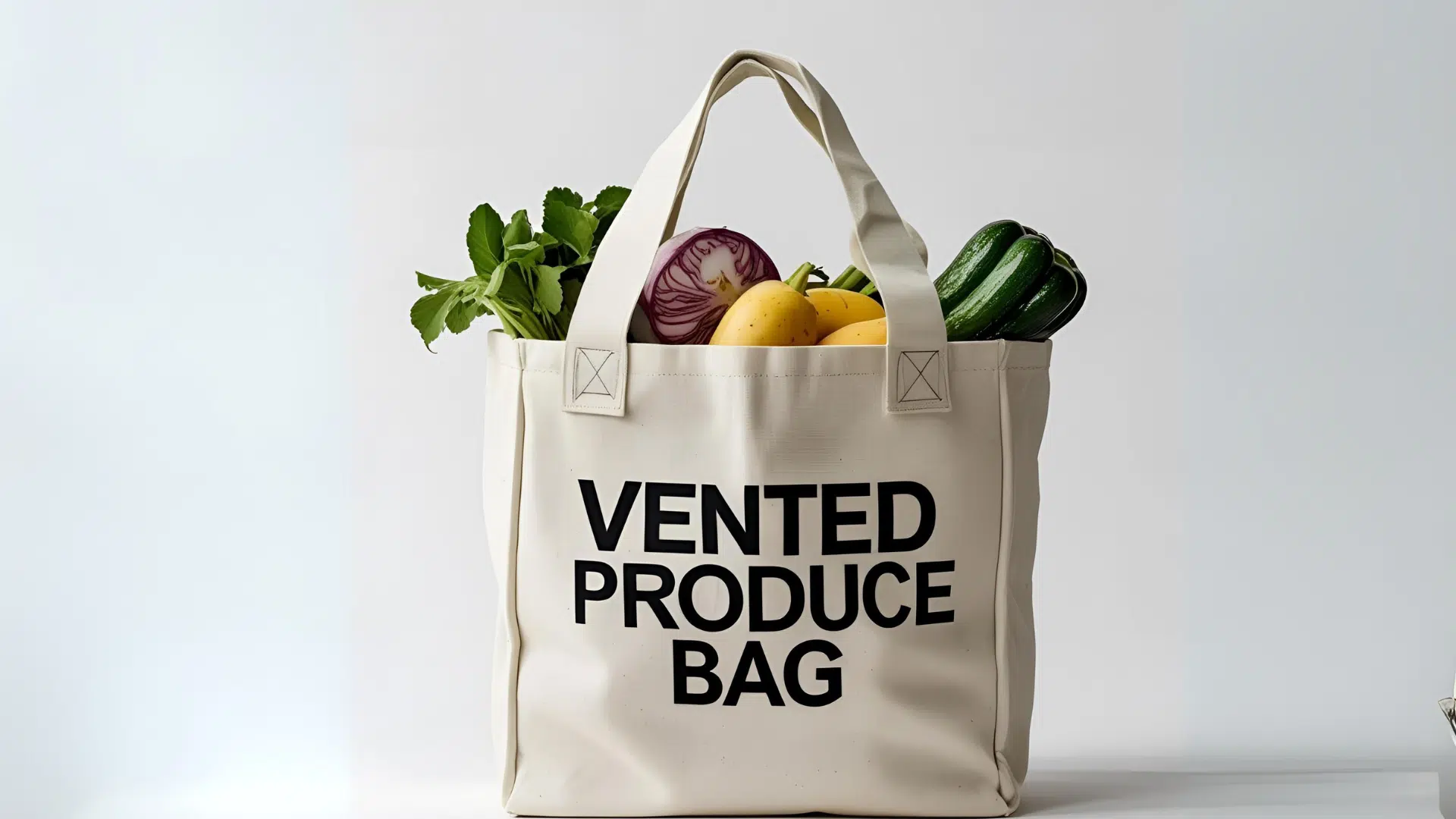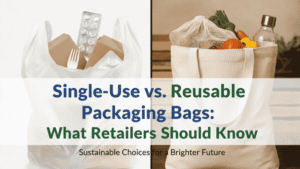
How Vented Produce Bags Keep Food Fresh Longer

For any food business, it is important to keep their fruits and vegetables fresh for longer. Some small things, like packaging bags, can make a big difference in this effort. No wonder vented produced bags are an essential tool for such businesses.
These bags are designed to improve the shelf life of your produce. It preserves it for longer than traditional storage methods.
This guide will walk you through all key aspects related to vented produce bags, including how they work, their efficiency, and usage. Let’s get started.
What Are Vented Produce Bags?
Vented produce bags are reusable or disposable bags designed to store fruits and vegetables. These are made of mesh-like fabrics or have tiny perforations (holes) that allow air to flow around the fruit, unlike ordinary plastic bags. The preservation of freshness depends on this airflow. The materials used in their construction are cotton, polyester, or other breathable materials as well as disposable polyethylene. From delicate berries to substantial root veggies, they are available in a variety of sizes.
Ventilated produce bags are primarily designed to replicate the natural circumstances in which fruits and vegetables grow.
They are available in various sizes to accommodate everything from berries to root veggies. Ventilated produce bags aim to replicate the natural circumstances in which fruits and vegetables grow.
By allowing air to flow and managing moisture levels, these bags help prevent spoilage, mold, and wilting, which are common issues with traditional plastic bags or containers.
How Vented Produce Bags Keep Fruits and Vegetables Fresh for Longer
1. Improved Air Circulation
Even after they are harvested, fruits and vegetables continue to “breathe.” They are likely to absorb oxygen during this process, known as respiration, and exhale carbon dioxide and water vapor. However, fruits and vegetables are likely to spoil more quickly when kept in a sealed plastic bag or container. This is because the moisture and trapped gases in these bags or containers lead to a stuffy, humid environment. Vented produce bags let air flow freely, thanks to their mesh or perforations. This slows down respiration. It also preserves the freshness of produce by reducing the accumulation of moisture and carbon dioxide.
For instance, when stored in a sealed bag, leafy greens like lettuce or spinach are likely to wilt. Produce bags’ airflow keeps extra moisture from accumulating, keeping these greens fresh.
2. Moisture Control
Although moisture is important for produce, it comes with its share of downsides. While too little moisture can cause produce to dry out and wilt, excessive moisture can cause mildew and decay. Produce bags with vents create a balance by letting extra moisture escape through the holes while preserving just the right amount of moisture to keep the produce hydrated. This is particularly useful for root vegetables like carrots, which can turn rubbery if they lose too much moisture, or berries, which are prone to mold.
3. Management of Ethylene Gas
Several fruits release a natural gas known as ethylene as they ripen. Examples include tomatoes, apples, and bananas. Although this gas helps in the ripening of fruit, it can also hasten the deterioration of nearby produce, particularly ethylene-sensitive foods like broccoli or leafy greens. Produce bags with vents let ethylene gas escape rather than become trapped, preventing other nearby fruits and vegetables from ripening too quickly or spoiling.
4. Decreased Growth of Bacteria
Warm, damp, and stagnant conditions are ideal for the growth of mold and bacteria. Vented produce bags make the environment less favorable to these bacteria that cause spoiling by increasing airflow and decreasing surplus moisture.
Benefits of Using Vented Produce Bags
Now that we know how these bags work, let’s look at the benefits they offer:
Extended Shelf Life
Vented produce bags can increase the shelf life of fruits and vegetables by days or even weeks. Strawberries kept in vented bags, for instance, can last for up to two weeks in the refrigerator compared to only a few days in a sealed container.
Eco-Friendly Choice
Vented produce bags, which are composed of recycled materials or organic cotton, are a sustainable packaging option. They reduce the need for single-use plastic bags, which contribute to environmental pollution. Disposable vented bags are a better option than regular plastic bags because they can frequently be recycled.
By investing in solutions that reduce food waste and potentially use eco-friendlier materials, you can position your business as environmentally conscious. This resonates strongly with today’s consumers who increasingly prioritize sustainable practices.
Adaptability
From robust potatoes to delicate herbs, a broad range of fruits and vegetables can be stored in vented produce bags.
Maintain Optimal Quality and Appearance
No one wants to buy wilted vegetables. Vented bags help maintain the crispness, color, and overall appeal of your fruits and vegetables. When produce “sweats” in a sealed bag, it can become slimy, discolored, or lose its firm texture. Vented bags keep them looking their best, which directly influences customer perception and purchasing decisions.
Enhance Customer Satisfaction and Loyalty
When customers consistently find fresh, high-quality produce at your establishment, they’re more likely to return. Vented bags ensure that the produce your customers take home stays fresh for longer, leading to a more satisfying experience. This builds trust and encourages repeat business, which is invaluable for long-term success.
Using Vented Bags for Your Business
Looking to keep your produce fresher and reduce waste? Vented bags are a simple, effective solution. Here’s how your business can benefit:
Receive and Store:
To preserve quality right away, use vented bags as soon as you receive fresh produce. These bags can also be provided at a checkout.
Retail Display:
For a visually beautiful and long-lasting retail display, pack products like potatoes, apples, and leafy greens in vented bags.
Bulk Storage:
Perfect for back-of-house storage of items like onions or carrots, preventing mold and sprouting.
Final Thoughts
Vented produce bags are a simple, affordable, and effective way to keep your fruits and vegetables fresh longer.
By allowing air circulation, controlling moisture, and managing ethylene gas, these bags create the perfect environment for your produce to thrive. It is safe to say that they are an important investment for food businesses like restaurants, farming, and grocery stores.
Share:
Get A Quick Quote
Social Media
Most Popular


Essential Plastic Bags Used in Healthcare Packaging and Their Uses


What Retailers Should Know About Plastic Shopping Bag Myths
Categories
Tags
Related Posts

How to Avoid the Top Mistakes When Using Plastic Evidence Bags
Proper evidence handling is the backbone of any successful investigation. From crime scenes to courtrooms, the integrity of physical evidence determines whether facts hold up

Essential Plastic Bags Used in Healthcare Packaging and Their Uses
In modern healthcare environments, safe and reliable packaging plays a critical role in infection control, organization, and operational efficiency. From hospitals and clinics to laboratories

Single-Use vs. Reusable Packaging Bags: What Retailers Should Know
Packaging plays a critical role in retail operations, customer experience, and brand perception. One of the most important decisions retailers face today is choosing between
